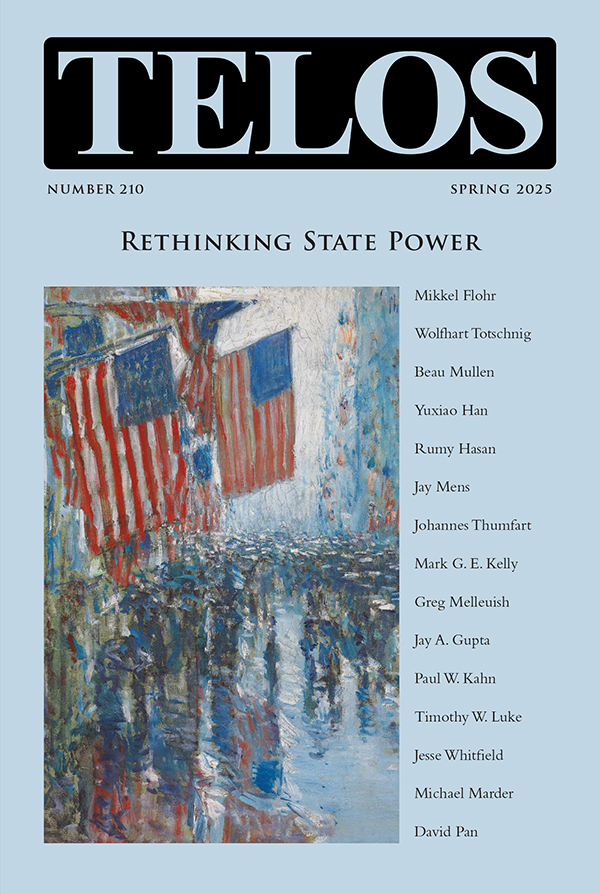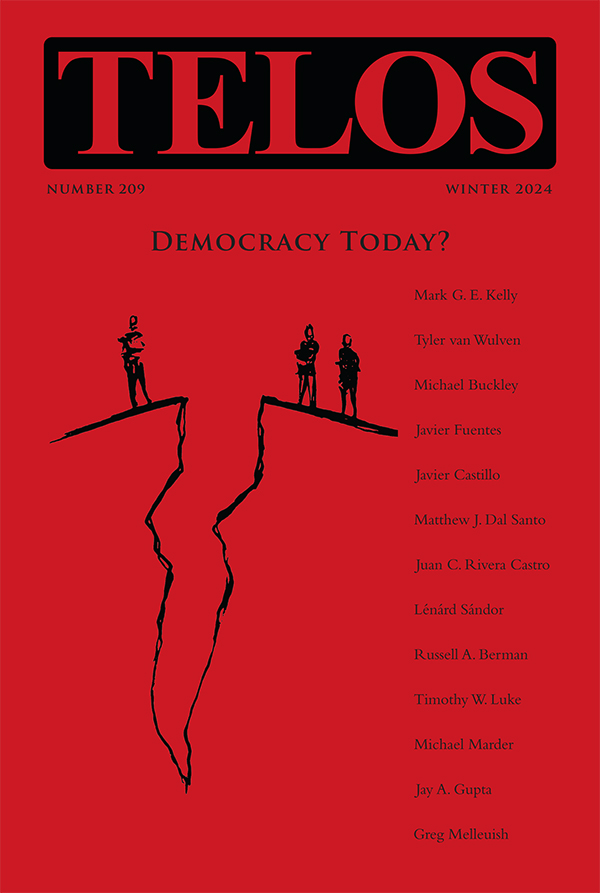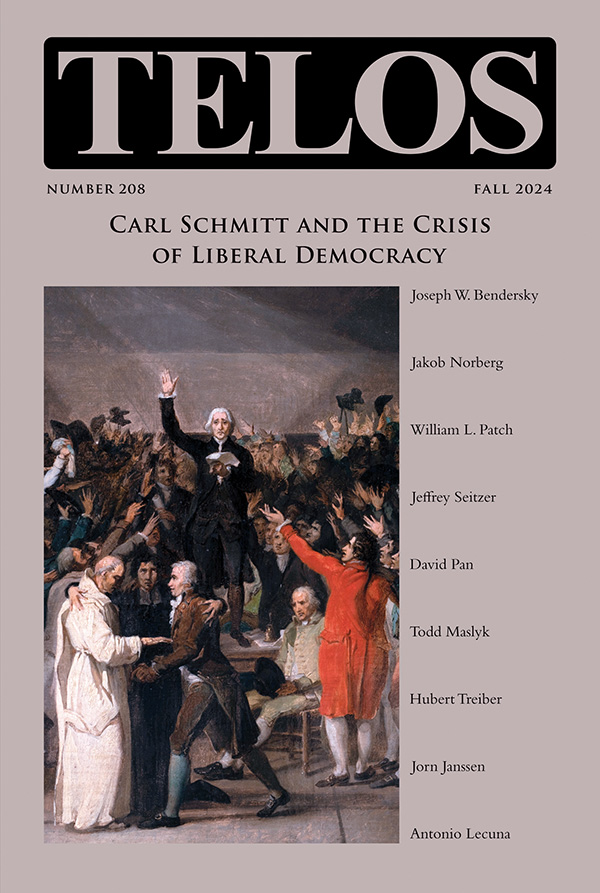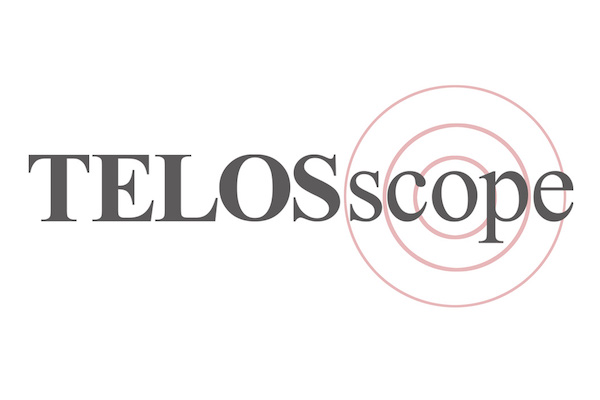By David Pan · Monday, March 24, 2025 Telos 210 (Spring 2025): Rethinking State Power is now available for purchase in our store. Individual subscriptions to Telos are also available in both print and online formats.
 Frustrating the hopes of cosmopolitans and globalists, state power is back. Rather than imagining a replacement of sovereignty with law, political debates now revolve around the particular forms that state sovereignty might take. Even Europe, long seeing itself as the place from which a new international legal order might expand its reach, is reinvesting in military power to protect its sovereignty from the threats posed by Russia, China, and, in some ways, the United States. Yet this realization about the continuing centrality of the state does not mean an abandonment of the moral imperatives and prejudices of the people. On the contrary, state power is being recognized as the instrument through which the people can exercise their will, even as the state places constraints on popular sovereignty. The essays in this issue of Telos consider the ways in which state power interacts with popular attitudes and social institutions in order to establish the basis for sovereignty and law. Frustrating the hopes of cosmopolitans and globalists, state power is back. Rather than imagining a replacement of sovereignty with law, political debates now revolve around the particular forms that state sovereignty might take. Even Europe, long seeing itself as the place from which a new international legal order might expand its reach, is reinvesting in military power to protect its sovereignty from the threats posed by Russia, China, and, in some ways, the United States. Yet this realization about the continuing centrality of the state does not mean an abandonment of the moral imperatives and prejudices of the people. On the contrary, state power is being recognized as the instrument through which the people can exercise their will, even as the state places constraints on popular sovereignty. The essays in this issue of Telos consider the ways in which state power interacts with popular attitudes and social institutions in order to establish the basis for sovereignty and law.
Continue reading →
By David Pan · Monday, January 6, 2025 Telos 209 (Winter 2024): Democracy Today? is now available for purchase in our store. Individual subscriptions to Telos are also available in both print and online formats.
 Since the supposed triumph of liberal democracy with the end of the Cold War, democracy seems now to be in retreat. The hung parliaments in France and Germany, reminiscent of the divides of Germany’s Weimar Republic; the just-in-time reversal of the declaration of martial law in South Korea; the increasing authoritarianism of China, Iran, and Russia; and the deterioration of democratic norms in the United States are all indications that the liberal democratic end of history was a chimera. Since the supposed triumph of liberal democracy with the end of the Cold War, democracy seems now to be in retreat. The hung parliaments in France and Germany, reminiscent of the divides of Germany’s Weimar Republic; the just-in-time reversal of the declaration of martial law in South Korea; the increasing authoritarianism of China, Iran, and Russia; and the deterioration of democratic norms in the United States are all indications that the liberal democratic end of history was a chimera.
What is the situation of democracy today? Are the present problems simply growing pains in the inevitable march of history, or are there fundamental limitations of this political form? Is democracy a stable form of government or a delicate balancing act that will always be at risk of deteriorating and being replaced by some form of authoritarianism?
These current indications of the precarity of democracy also coincide, however, with an intense concern for its future. Never has there been such a focus on democracy as a political goal. During the Cold War, the United States, more concerned about promoting capitalism than defending democracy, supported capitalist authoritarianism in places such as Chile, South Korea, and Taiwan. But as it turned out, capitalism did not really need such political backing. In the Cold War between capitalism and communism, the latter lost based on its inability to produce economic growth. Insofar as communism’s undermining of private property and market mechanisms proved to be economically catastrophic, even nominally communist governments in China and Vietnam have since voluntarily embraced capitalist economic policies. Aside from U.S. college campuses, the only diehard Marxists left are in Cuba, North Korea, and Venezuela, all of whose governments are presiding over the immiseration of their peoples.
While it was the Soviet Union, and not capitalism, that collapsed under the weight of its own contradictions, the general recognition of these contradictions meant that communism could only maintain itself by using repressive methods. Communism has been one of the surest ways of moving toward and cementing authoritarianism and totalitarianism. By contrast, capitalist authoritarianism has sometimes led to democratic reforms, and we can point again to Chile, South Korea, and Taiwan, but also to the countries of Eastern Europe, as successful transitioners to democracy within a capitalist framework. Unfortunately, while communism might correlate strongly with authoritarianism, the link between capitalism and democracy does not seem to be so tight.
Continue reading →
By Peshraw Mohammed · Tuesday, December 3, 2024 Hamid Dabashi’s critique—or more accurately, his attack—on Hegel in the article “War on Gaza: How Hegel’s Racist Philosophy Informs European Zionism” represents an emerging trend in certain intellectual circles: dismissing European philosophy as fundamentally racist while advancing exclusionary regional ideologies, often excluding nations like Kurds and Jews by denying their identities and national aspirations. While Dabashi ostensibly raises valid concerns about colonialism and Eurocentrism, his interpretation—or more accurately, his misinterpretation—of Hegel is selective, reductive, and deeply entangled with a postcolonial hostility to the radical Enlightenment tradition embodied by thinkers such as Spinoza, Kant, and Hegel.
Drawing on the more nuanced readings of scholars like Susan Buck-Morss (who is misrepresented by Dabashi in the same article), Shlomo Avineri, and Domenico Losurdo, this response argues that Dabashi distorts Hegel’s philosophy and, in doing so, perpetuates the ideological prejudices embodied by pan-Iranism, pan-Arabism, pan-Turkism, and Islamism. Furthermore, I will explore why Hegel’s thought, as a philosophy of emancipation, holds critical significance for the self-determination of historically oppressed nations, particularly the Jews and Kurds. I begin by discussing how Dabashi misrepresents Hegel’s philosophy to advance his own chauvinistic and antisemitic agenda, while also indirectly exposing his fear toward Hegel as a thinker whose ideas could support both Kurds and Jews in their pursuit of statehood and nationality. Dabashi, an Iranian-American professor of Iranian Studies and Comparative Literature at Columbia University, frequently writes about topics such as Palestine, Israel, Kurdistan, and Iran, consistently intertwining them with Iranian nationalist chauvinism, antisemitism, and antikurdism, all disguised under the facade of progressive leftist ideas—a facade that must be unmasked.
Continue reading →
By David Pan · Friday, October 18, 2024 Telos 208 (Fall 2024): Carl Schmitt and the Crisis of Liberal Democracy is now available for purchase in our store. Individual subscriptions to Telos are also available in both print and online formats.
 It hardly needs mentioning that liberal democracy is facing a number of threats today, both internal and external. Even if the political parties in the United States cannot agree on the main source of the threats, they both believe that democracy is in danger. Democrats point to the January 6 Capitol riot and Trump’s role in it as examples of the way in which liberal democratic procedures are being directly attacked. Republicans point to the Democratic-backed court cases against Trump as well as the FBI’s favoritism toward Democrats in their public announcements before elections as evidence that the legal system and the administrative state are being used to shut out political opponents. Both parties point to violations of free speech rights at college campuses, yet they also both seek to establish limits to those rights in defense of liberal democratic values. It hardly needs mentioning that liberal democracy is facing a number of threats today, both internal and external. Even if the political parties in the United States cannot agree on the main source of the threats, they both believe that democracy is in danger. Democrats point to the January 6 Capitol riot and Trump’s role in it as examples of the way in which liberal democratic procedures are being directly attacked. Republicans point to the Democratic-backed court cases against Trump as well as the FBI’s favoritism toward Democrats in their public announcements before elections as evidence that the legal system and the administrative state are being used to shut out political opponents. Both parties point to violations of free speech rights at college campuses, yet they also both seek to establish limits to those rights in defense of liberal democratic values.
Meanwhile, authoritarian governments in places such as China, Russia, Iran, and North Korea have becoming increasingly aggressive in opposing liberal democracies as threats to their own legitimacy. In doing so, they have attempted to provide theoretical justifications for their authoritarian rule that are based in anti-Western and anti-colonial discourses that align with critiques of the West advanced by left-leaning academics in liberal democracies.
Because they are based on freedom of expression and freedom of conscience, liberal democracies must allow open public spheres whose dynamics could take unforeseen directions that end up undermining the cultural and procedural foundations of liberal democratic governance. While the American Revolution provides the best example of the success of liberal democracy, the French Revolution and the Weimar Republic demonstrate spectacular failures. Outside of the West, the contrast between Taiwan and China and between Indonesian democracy and the Iranian Revolution indicate that we can find the same contrasts between failure and success in East Asia and in the Islamic world.
Continue reading →
By Peshraw Mohammed · Wednesday, August 21, 2024 
The following essay originally appeared in German in Siebter Oktober Dreiundzwanzig: Antizionismus und Identitätspolitik, ed. Vojin Saša Vukadinović (Berlin: Querverlag, 2024), and appears here in English translation by permission of the author. Translated by Russell A. Berman.
 More than ever, leftists, political Islam, and postcolonial intellectuals have joined forces in an unholy alliance. Lacking an understanding of the history of Islamic expansionism, Arab colonialism, and Islamic antisemitism, parts of the Western left have come to regard any countermovement to the West as a fight against American imperialism. Therefore, the Islamic Republic of Iran and Islamist movements such as Hamas and Hezbollah are understood to be part of an anti-imperialist bloc. These tendencies were already observed in connection with the rise of the “Islamic State” (IS). When its terrorists attacked the Kurdish city of Kobanê, Kurdish militias fought IS in cooperation with U.S. forces. Some leftists in Germany, Britain, and the United States demanded that the United States stop its bombings. More than ever, leftists, political Islam, and postcolonial intellectuals have joined forces in an unholy alliance. Lacking an understanding of the history of Islamic expansionism, Arab colonialism, and Islamic antisemitism, parts of the Western left have come to regard any countermovement to the West as a fight against American imperialism. Therefore, the Islamic Republic of Iran and Islamist movements such as Hamas and Hezbollah are understood to be part of an anti-imperialist bloc. These tendencies were already observed in connection with the rise of the “Islamic State” (IS). When its terrorists attacked the Kurdish city of Kobanê, Kurdish militias fought IS in cooperation with U.S. forces. Some leftists in Germany, Britain, and the United States demanded that the United States stop its bombings.
What was the point of their demand? The United States carried out air strikes to support Kurdish ground troops in order to defeat Islamic terrorism. Failure to bomb IS positions would have resulted in IS conquering Kurdish areas in order to enslave or kill women and children. In the end, as in the case of the Yazidis, genocide could have been the outcome. The anti-Zionist cultural historian Hamid Dabashi compares the Kurds to the Jews and sees a prospective establishment of an independent Kurdistan as the “second settler-colonial Israel.”
The fixation of large parts of the left on the United States while simultaneously remaining indifferent to Russian, Chinese, Iranian, or Turkish imperialism has led to serious political misjudgments. This includes the idea that every form of Western thought, art, or literature is part of a colonial project. The works of progressive philosophers such as Rousseau, Hegel, Marx, Sartre, and even Frantz Fanon are now viewed as contributing to the reproduction of European white hegemony and are consequently rejected.
Continue reading at Telos Insights →
Continue reading →
The following essay originally appeared in German in Bahamas 94 (Spring 2024). Translated by Xuxu Song.
 For decades now, everything has been known about Rudolf Höss and his ostensible double life as both an enforcer of the Holocaust and a loving family man. Robert Merle’s 1953 roman à clef Death Is My Trade was based in part on publicly accessible notes that Höss had composed while in prison for war crimes. Pictures of the affable Mr. Höss with his wife and colleagues appeared in Alain Resnais’s 1956 film Night and Fog. The testimony of prison psychologist Gustav M. Gilbert, who had spoken with Höss at length in Nuremberg, came up in 1961 during the Eichmann trial. Höss’s autobiographical notes were published by DTV in 1963 under the title Commandant of Auschwitz. Things got especially German in 1977 when the film Death Is My Trade—the German title translates as Excerpts from a German Life—by Theodor Kotulla, based on Robert Merle’s novel and starring the prominent actor Götz George, the son of two celebrated German thespians, was released in German cinemas. A review from the Catholic magazine Filmdienst in December 1977, and quoted on Wikipedia, revealingly states: For decades now, everything has been known about Rudolf Höss and his ostensible double life as both an enforcer of the Holocaust and a loving family man. Robert Merle’s 1953 roman à clef Death Is My Trade was based in part on publicly accessible notes that Höss had composed while in prison for war crimes. Pictures of the affable Mr. Höss with his wife and colleagues appeared in Alain Resnais’s 1956 film Night and Fog. The testimony of prison psychologist Gustav M. Gilbert, who had spoken with Höss at length in Nuremberg, came up in 1961 during the Eichmann trial. Höss’s autobiographical notes were published by DTV in 1963 under the title Commandant of Auschwitz. Things got especially German in 1977 when the film Death Is My Trade—the German title translates as Excerpts from a German Life—by Theodor Kotulla, based on Robert Merle’s novel and starring the prominent actor Götz George, the son of two celebrated German thespians, was released in German cinemas. A review from the Catholic magazine Filmdienst in December 1977, and quoted on Wikipedia, revealingly states:
The interchangeability of collective thinking and The Enemy becomes frighteningly clear in Kotulla’s emotionless psychohistorical analysis….In Kotulla’s film, political and moral superficiality and the volatile idea of “peace, order and above all cleanliness,” irrationally propagated as the highest value in itself—under this pretext, up to 9,000 people were sent into the “shower room” every day in Auschwitz—rightly appears as the main cause of the totalitarian abuse of power, which is why it can continue to function openly or covertly worldwide in various forms and ideological guises. In this respect, this fact-oriented fiction is a lesson that every teacher, especially every history teacher, should discuss with young people.
Even back then, the pedagogical lesson lay in the notion that Auschwitz merely provided the backdrop for vague musings about man’s responsibility for his actions in times of unfreedom.
Read the full article at the Telos Insights website.
Continue reading →
|
|
 Frustrating the hopes of cosmopolitans and globalists, state power is back. Rather than imagining a replacement of sovereignty with law, political debates now revolve around the particular forms that state sovereignty might take. Even Europe, long seeing itself as the place from which a new international legal order might expand its reach, is reinvesting in military power to protect its sovereignty from the threats posed by Russia, China, and, in some ways, the United States. Yet this realization about the continuing centrality of the state does not mean an abandonment of the moral imperatives and prejudices of the people. On the contrary, state power is being recognized as the instrument through which the people can exercise their will, even as the state places constraints on popular sovereignty. The essays in this issue of Telos consider the ways in which state power interacts with popular attitudes and social institutions in order to establish the basis for sovereignty and law.
Frustrating the hopes of cosmopolitans and globalists, state power is back. Rather than imagining a replacement of sovereignty with law, political debates now revolve around the particular forms that state sovereignty might take. Even Europe, long seeing itself as the place from which a new international legal order might expand its reach, is reinvesting in military power to protect its sovereignty from the threats posed by Russia, China, and, in some ways, the United States. Yet this realization about the continuing centrality of the state does not mean an abandonment of the moral imperatives and prejudices of the people. On the contrary, state power is being recognized as the instrument through which the people can exercise their will, even as the state places constraints on popular sovereignty. The essays in this issue of Telos consider the ways in which state power interacts with popular attitudes and social institutions in order to establish the basis for sovereignty and law. 





